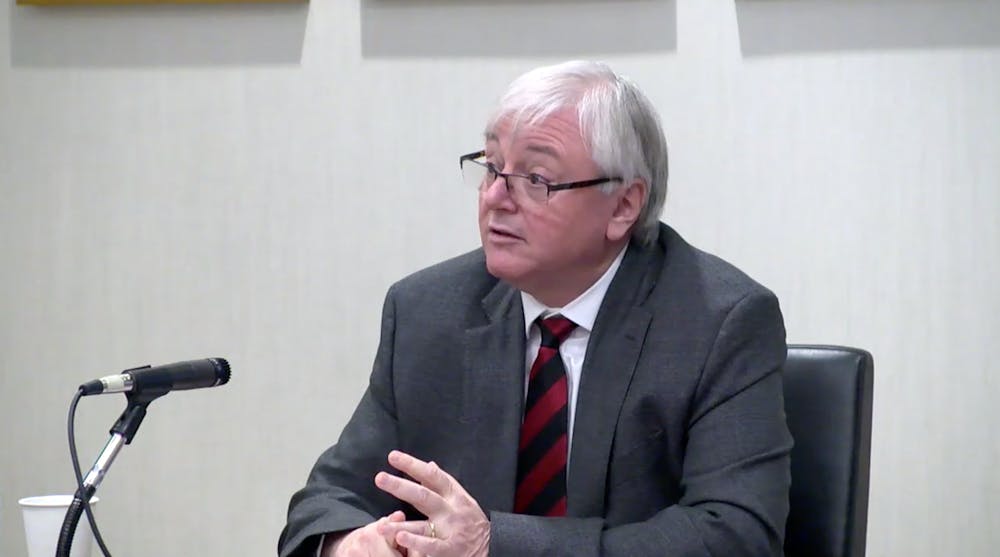Michael Amiridis is USC's new president-elect, the board of trustees unanimously voted on Friday. Amiridis will make $900,000 a year.
He will officially replace interim university President Harris Pastides as the leader of USC this summer, university spokesperson Jeff Stensland confirmed.
Amiridis, the current chancellor of the University of Illinois Chicago, has two decades of experience at USC.
He received his Ph.D. in chemical engineering from the University of Wisconsin-Madison in 1991 before joining the USC faculty in 1994 as an assistant professor in the Department of Chemical Engineering.
He then became the dean of USC's College of Engineering and Computing in 2006 and became Executive Vice President for Academic Affairs and Provost in 2009. He left USC in 2015 for the University of Illinois Chicago.
The board of trustees meeting followed a morning of sessions with Amiridis, who will become the 30th president of the University of South Carolina. The Q&A sessions centered around academic excellence, research and innovation, system-wide excellence and diversity, equity and inclusion.
During the panel focused on diversity, equity and inclusion, Amiridis said there is no room for sexual predators and sexual harassment in an academic community and emphasized the importance of training faculty and staff on Title IX and workplace hostility.
“My goal is also to be proactive, not only to rectify situations but prevent situations,” Amiridis said. “We need to make sure that the structures that are in place to support survivors, to report and to investigate are consistent with the best national practices and standards.”
He said he worked on building cultural diversity at the University of Illinois Chicago by creating two cultural centers: The Arab-American Cultural Center and the Disability Cultural Center. He also said he created a racial equity task force, called Advance Racial Equity (ARE), that yielded “remarkable results.”
Student Body Vice President Emily Dengler said she is excited to see how he applies his background in diversity to the USC campus.
"I'm feeling really really great about him, to be honest. It was a quick turnaround — I just met him this morning," Dengler said. "His resume speaks for itself. He's extremely qualified and I love that he has experience at Carolina."
The Q&A sessions were announced midday on Thursday in an email from the board of trustees to the university community. The university did not announce Amiridis' name or qualifications prior to the meeting.
The announcement came a day after the university called a board of trustees meeting that was entirely in executive session.
This comes after Mung Chiang, Purdue University's engineering dean, who The Post and Courier reported in December was the university's top pick, withdrew his name.
Before Chiang withdrew his name, he was set to meet with students, faculty and staff on Dec. 9, during final exam week, university spokesperson Jeff Stensland confirmed. The meeting never took place.
Prior to Chiang's announcement, Amiridis' name had also been in media coverage.
The presidential search committee began interviewing 20 candidates in early November, according to reporting by The State. As of Jan. 14, the university has not made other candidate names available.
The search process has already come under scrutiny, as USC donor and the owner of the Nephron Pharmaceuticals Corporation Lou Kennedy resigned from the presidential search committee in November.
The incident occurred while the committee interviewed candidates for the position of university president.
Carol Harrison, the president of USC's chapter of the American Association of University Professors (AAUP), said she would have liked more finalists to come to campus.
"You learn a lot about a candidate by seeing him or her on campus, interacting with the university's executive leadership, their faculty, their students. And I'm sorry we didn't have the opportunity to do that," Harrison said.
The previous presidential search, which resulted in hiring former university President Bob Caslen, was full of controversy.
Because of concerns "related to the propriety of the 2018-19 presidential search and undue external influence in the search itself," the accrediting board reviewed the presidential search process.
In its review, the university's accrediting agency, the Southern Association of Colleges and Schools Commission on Colleges (SACSCOC), found in early 2020 that the presidential search process for hiring Caslen breached two standards.
In response to this, the university enacted multiple changes to its presidential search process, according to its monitoring report to the SACSCOC.
"The Board has enacted multiple innovations: a Code of Conduct and Oath of Office for Trustees, a policy for protecting the Board and USC System from external influence, a policy outlining the fiduciary duties of Trustees, a revised orientation program for new Trustees, and a new continuing education curriculum for Trustees," the monitoring report said. "The Board has revised its committee structure, and the new Governance Committee will serve as the body for further assessment and revisions of governance policies and procedure."
After making these changes, the university was removed from monitoring status in early 2021.
"While only time, and the opportunity to conduct a new presidential search, will tell whether these changes made the intended difference, the charge to the Special Committee was to assess whether the enacted changes offer reasonable strong protection against a similar crisis occurring in the future," the SACSCOC said in response to USC's monitoring report.
SACSCOC has no complaints about the current presidential search process, a representative told The Daily Gamecock on Dec. 6.
Editor's note: This is a developing story. This article was last updated on Jan. 14, 2022 at 4:40 p.m.
Stephen Pastis, Caleb Bozard, Ian Grenier, Tyler Fedor and Max White contributed to reporting in this article.

